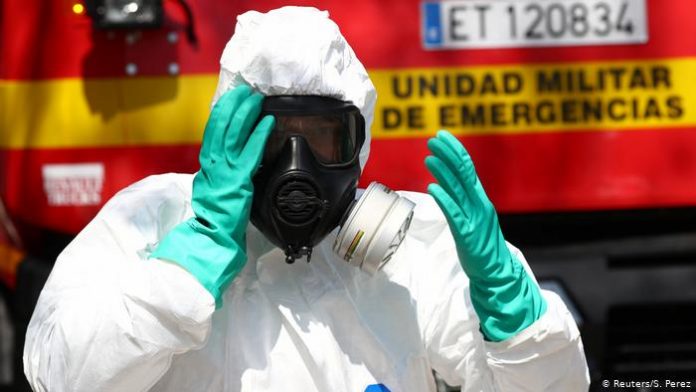The coronavirus pandemic has killed more than 60,000 people in Europe as of 4.15pm GMT (5.15pm BST) on Wednesday, according to an AFP tally compiled from official sources.
That figure accounts for more than 70% of the deaths so far officially recorded worldwide. Italy remains the worst-hit country, with 17,669 deaths, followed by Spain with 14,555.
– The European Union has reshuffled its aid budget and promised €20bn (£17.5bn) to help countries in Africa, Asia and the Pacific tackle coronavirus, as well as near neighbours in eastern Europe, Jennifer Rankin reports from Brussels.
Following a conference call of EU development ministers, the EU’s chief diplomat, Josep Borrell, told journalists he expected more than €20bn would be available to help countries around the world.
“Unless the virus is defeated everywhere, it will not be defeated anywhere,” he said.
The funds come from reorganising the EU’s existing aid budget. EU officials have insisted no country will get less than promised before the outbreak, while vital programmes on nutrition, sanitation, health and education will continue.
Earlier on Wednesday the EU announced €15.6bn in coronavirus aid, which includes €5.2bn in loans from the EU’s lending arm, the European Investment Bank.
Africa has been earmarked €3.25bn, while a further €3.07bn is for countries on or near the EU’s southern and eastern borders, including some Middle Eastern nations, as well as Belarus, Ukraine, the Caucasus, Turkey and the Balkans.
Borrell said Belarus had asked for help in tackling the virus and dealing with the impact on its economy, and could expect to get around €60m.
After the meeting it emerged EU member states had pledged €4bn, while the European Bank for Reconstruction and Development was ready to offer €1bn, taking the total funds to more than €20bn. But it was not immediately clear how much of that money was grants or loans.
Borrell said Africa was a priority for the EU, as the coronavirus could have “consequences of an entirely different scale than in other parts of the world”.
The World Health Organization warned this week that cases were “increasing exponentially in the African region”, while local experts have stressed that sub-Saharan Africa lacks intensive care facilities, which could bring devastating results.








